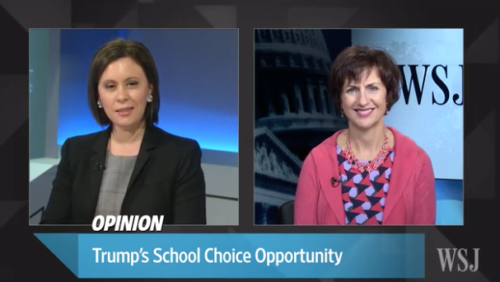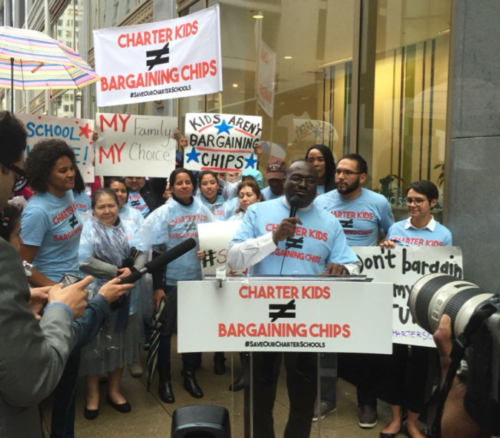by Laura McKenna
The Atlantic
November 21, 2016
Many eyes have been on Trump Tower as the president-elect and his transition team have started to select key cabinet positions. Effectively shutting down Fifth Avenue in Manhattan during these deliberations, the team is making decisions that will shape wide-ranging policies, on everything from immigration to trade, in the coming years.
For people like myself who are closely monitoring what the future will look like for schools, the locus of attention is not on Trump Tower, but on the state capitals, which have the greatest power over America’s classrooms. Like the upheaval that happened with the national election, the states had somewhat of their own shake up this November, with Republicans winning a record number of legislative spots—and a historic high for governorships—in what some have described as a “bloodbath.”
Beginning in January 2017, Republicans will control two-thirds of the state legislative chambers, an all-time high. The GOP will control both legislative chambers in 32 states, another all-time high; the same is true for Democrats in just 13 states. Republicans will hold 33 governorships for the first time in 94 years. And 25 states have a Republican trifecta with control of the executive branch and both legislative chambers.
These new state-level Republican leaders will certainly make major decisions about America’s schools in the next few years. Experts predict more school-choice legislation, greater conflict over education funding, and increased challenges to teacher-tenure laws. While Republicans are not a monolithic block—their priorities will vary from state to state—the country can expect to see certain trends unfold over the next few years.
[…]
Trump’s secretary of education—as of Sunday, the former D.C. schools chief Michelle Rhee and the Center for Education Reform director Jeanne Allen are reportedly being considered—as well as Pence and Trump himself, will shape schools by using their platform with the national media to reach the country. But the less flashy occupants of the country’s state capitals will have the biggest impact on schools; and with their sweep in November’s elections, Americans can expect some major shifts in policy.
To read the entire article visit The Atlantic.
















EdReform Revived Event Summary
Educational freedom drives innovation that shocks the status quo, inserts competition, and ultimately contributes to the superior outcomes that result from content excellence delivered through great school.
NOTE: A more comprehensive report is coming soon, including videos and full resource bank. Access part of the TRANSCRIPT from the event here!
This one-day event was the launching point for the leaders in the field to transposition the public conversation on educational reform. This is the beginning of us collectively changing of the conversation, and broadening. The support base which will result in an increased focus on opportunity, innovation and content knowledge.
Contributors who underwrote the conversation:
Ms. Jeanne Allen
Founder & CEO, The Center for Education Reform
Dr. Jay Greene
Distinguished Professor & Head of the Department of Education Reform, University of Arkansas
Dr. Susan Dynarski
Professor of Education, Public Policy & Economics, Gerald R. Ford School of Public Policy, School of Education & Dept. of Economics
Dr. Marcus Winters
Senior Fellow, Manhattan Institute for Policy Research
Mr. Robert Pondiscio
Senior Fellow & Vice President for External Affairs, Thomas B. Fordham Institute
Dr. Jay Greene
Distinguished Professor & Head of the Department of Education Reform, University of Arkansas
Dr. Gerard Robinson
Resident Fellow, Education Policy Studies, American Enterprise Institute
Mr. Tom Vander Ark
CEO & Partner, Getting Smart
Mr. Robert Jackson
Chief Academic Officer, GreatHearts
Mr. Max Eden
Senior Fellow, Manhattan Institute for Policy Research
Mr. Matthew Ladner
Senior Advisor, Policy & Research, The Foundation for Excellence in Education
Ms. Mary Stafford
Co-Founder, TRUEnorth Education Partners
Dr. Michael Horn
Co-Founder & Distinguished Fellow, Clayton Christensen Institute for Disruptive Innovation
Mr. Jonathan Hage
Founder & CEO, Charter Schools USA
Ms. Susie Miller Carello
Executive Director, SUNY Charter Schools Institute
Mr. Robert Enlow
President & CEO, EdChoice
Hon. Tim Kelly
Michigan House of Representatives
Dr. Michael Q. McShane
Director of Education Policy, The Show-Me Institute
Mr. John Bailey
Former White House Advisor
Dr. Ted Kolderie
Co-Founder & Senior Fellow, Education Evolving
Topics Discussed:
ISOMORPHISM IN EDREFORM
THE GOLD STANDARD OF RESEARCH
THE CONNECTION BETWEEN KNOWLEDGE & ASSESSMENT
REGULATION STIFLING INNOVATION
UNINTENDED CONSEQUENCES OF REFORM POLICY AND PRACTICES
NEXT STEPS ANTICIPATING THE FUTURE
Takeaways:
The conversation between advocates, researchers and policymakers resulted in 10 takeaways—and perhaps an early framework to revive EdReform. Tom Vander Ark provides insight in Education Week.